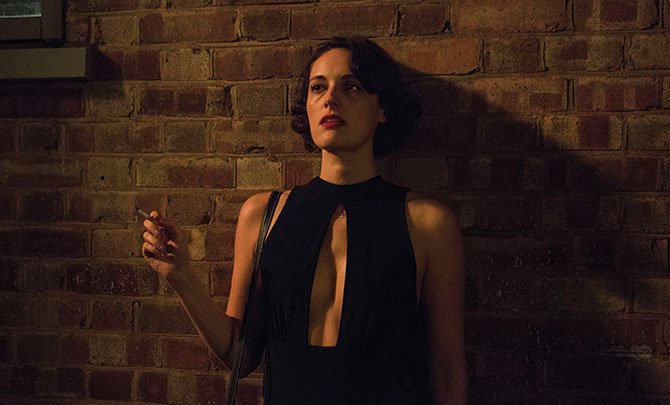Here & now: Victoria Turner - Reform Magazine
‘Here & now’ is a new column giving a voice to younger writers in the Church
The BBC series Fleabag absolutely catapulted Phoebe Waller-Bridge (pictured) into public light. The protagonist, the otherwise anonymous ‘Fleabag’, is the epitome of the never-settling, forever questioning, reason-searching, young-ish adult stuck in postmodernity. The first series focussed, in a startlingly frank way, on her troubled relationship with sex, employed as a coping mechanism for her disastrously crumbling yet never-addressed mental state.
So where do you go from there? In the second series, Fleabag meets a Catholic priest. Wonderfully played by Andrew Scott, the priest is surprising, shocking, unorthodox, and human! At a family dinner, Fleabag seems lost and unnoticed. However, the priest acknowledges her and asks questions beyond the usual polite, surface-skimming tactics employed to avoid real answers. She’s surprised, and her cool, witty mannerisms are flattened. She escapes for a cigarette. The priest joins her. She’s again surprised. He asks her a question and she doesn’t answer. ‘F*** you,’ he says. The scandal! She can’t quite believe it. Are priests meant to swear? And smoke? She notices how attractive he is and smiles as she walks away, truly matched intellectually.
The next few episodes watch Fleabag try out Christian life. After reluctantly accepting a Bible, with verses picked out for her, she is persuaded into an act of confession and her stoic nature completely breaks down. In a moving monologue, she delves into her complicated grief, rejection and guilt, listened to attentively by the overly-invested priest. The intervention of God is suggested through pictures being thrown off walls and the priest’s sincere acknowledgement of divine action, coming at vital moments. Fleabag is shaken by God’s activity. Their journey continues, the two characters are dangerously intertwined, and so Fleabag dabbles with the idea of Christianity and the priest struggles with his attraction to the confident, yet noticeably damaged, seeker.
Why am I swearing and talking about sex and Catholic scandals in Reform? It’s not just because I’m a revolting youth. The most shocking thing about this series is that Waller-Bridge considered an exploration with religion more outrageous than explicitly talking about sex. And you can see why, because the results are gripping.
How has Christianity become such a taboo in our society? Recollecting my time at a Church-in-Wales high school, I scarcely remember ever having a conversation about our faith. It would have been unusual to proclaim oneself a Christian in the school, despite its confessional purpose. Then when I studied religion and theology at the University of Bristol, I found myself one of only three Christians in our class of 30. Speaking from a confessional standpoint in our lectures was deemed ‘unacademic’ by many other students, and sometimes simply incomprehensible. ‘Christians are those crazy street preachers who condemn same-sex relations and tell me I’m going to hell. Or worse, those persistent ladies who knock on my door every Thursday at 10am.’
How can we connect to our world, where people are overly connected yet depressingly absent? Christians have become unrelatable in the public sphere, and our mission is to reverse that.
I was devastated on Easter Sunday by news of the Sri Lankan attacks. But what hurt me more was the sermon delivered by the Archbishop of Wales, reported on local news, who spoke of the horrors of… Brexit. Did he miss the news on his way to church? Or choose to stick to his well-prepared sermon out of stubbornness? Perhaps it was fear, feeling like he hadn’t had enough time to prepare.
We should always be fearful in our mission as Christians. As fearful as the Fleabag priest, knowing the danger when connecting to this person who obviously lacks connection. Humanity is messy, and perhaps exposing our flaws to the general public is more expedient than taking a professed higher stance. We need to lay ourselves bare and show our vulnerable reality at the foot of the cross, not hide behind our institutions and prepared resource books. It’s time to connect with our neighbours, wherever they are, and in the spirit of Missio Dei, be open to learning about our faith from them.
Fleabag made religion relatable and brought the conversation once again into the public sphere by mixing the humanness of Christianity with ingenious divine interventions. It showed the strength of the priest’s faith, but also his compelling normalness. Waller-Bridge’s comedy is raw, transfixing and complicated. Remind you of something else?
Victoria Turner is completing a master’s degree in world Christianity at New College, Edinburgh
___
This article was published in the July/August 2019 edition of Reform, kickstarting our column for young writers in the Church: ‘Here & now’. If you’re a young person and would like to contribute to ‘Here & now’, please get in touch, preferably by email to reform@urc.org.uk.












Submit a Comment